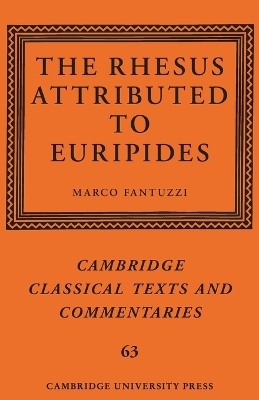
The Rhesus Attributed to Euripides
Seiten
2024
Cambridge University Press (Verlag)
978-1-107-62934-9 (ISBN)
Cambridge University Press (Verlag)
978-1-107-62934-9 (ISBN)
Full scholarly edition of the only complete poetic text from the fourth century BC, which bridges the classical age of tragedy and Hellenistic poetry and is a tragi-comic play paralleling the comic-tragic plays of Menander. Emphasises its intertextual engagement with its models and attempts to break free of them.
The tragedy Rhesus has come down to us among the plays of Euripides but was probably the work either of fourth-century BC actors or producers heavily rewriting his original play or of a fourth-century author writing in competition. This edition explores the play as a 'postclassical' tragedy, composed when the plays of Aeschylus, Sophocles and Euripides had become the 'classical' canon. Its stylistic mannerisms, cerebral re-use of the motifs and language of fifth-century tragedy, and endemic experimentalism with various models of intertextuality exemplify the anxiety of influence of the Rhesus as a text that 'comes after' fifth-century drama and Book 10 of the Iliad. The anachronistic adaptations of the world of the epic heroes to the new reality of the polis and the irresistible rise of Macedonian power also reveal the Rhesus attempting to be both seriously intertextual with its models and seriously different from them.
The tragedy Rhesus has come down to us among the plays of Euripides but was probably the work either of fourth-century BC actors or producers heavily rewriting his original play or of a fourth-century author writing in competition. This edition explores the play as a 'postclassical' tragedy, composed when the plays of Aeschylus, Sophocles and Euripides had become the 'classical' canon. Its stylistic mannerisms, cerebral re-use of the motifs and language of fifth-century tragedy, and endemic experimentalism with various models of intertextuality exemplify the anxiety of influence of the Rhesus as a text that 'comes after' fifth-century drama and Book 10 of the Iliad. The anachronistic adaptations of the world of the epic heroes to the new reality of the polis and the irresistible rise of Macedonian power also reveal the Rhesus attempting to be both seriously intertextual with its models and seriously different from them.
MARCO FANTUZZI is a Professor of Classics at the University of Roehampton, London. His publications include Bionis Smyrnaei Adonidis epitaphium (1985), Ricerche su Apollonio Rodio (1988), Tradition and Innovation in Hellenistic Poetry (Cambridge 2004; with R. Hunter) and Achilles in Love (2012). He co-edited (with R. Pretagostini) Struttura e storia dell'esametro greco (1995-1996), (with T. Papanghelis) Brill's Companion to Greek and Latin Pastoral (2006) and (with C. Tsagalis) The Greek Epic Cycle and Its Ancient Reception: A Companion (Cambridge 2015).
Introduction; Text; Commentary; Bibliography;
| Erscheinungsdatum | 30.01.2024 |
|---|---|
| Reihe/Serie | Cambridge Classical Texts and Commentaries |
| Zusatzinfo | Worked examples or Exercises |
| Verlagsort | Cambridge |
| Sprache | englisch |
| Gewicht | 876 g |
| Themenwelt | Geschichte ► Allgemeine Geschichte ► Vor- und Frühgeschichte |
| Geisteswissenschaften ► Sprach- / Literaturwissenschaft ► Anglistik / Amerikanistik | |
| Geisteswissenschaften ► Sprach- / Literaturwissenschaft ► Literaturwissenschaft | |
| ISBN-10 | 1-107-62934-9 / 1107629349 |
| ISBN-13 | 978-1-107-62934-9 / 9781107629349 |
| Zustand | Neuware |
| Haben Sie eine Frage zum Produkt? |
Mehr entdecken
aus dem Bereich
aus dem Bereich
auf den Spuren der frühen Zivilisationen
Buch | Hardcover (2023)
C.H.Beck (Verlag)
20,00 €
Konzepte – Methoden – Theorien
Buch | Softcover (2024)
UTB (Verlag)
39,90 €
Was Pompeji über uns erzählt
Buch | Hardcover (2023)
Propyläen (Verlag)
32,00 €


